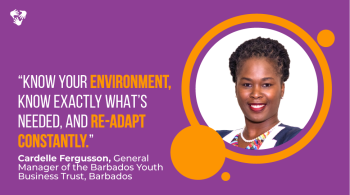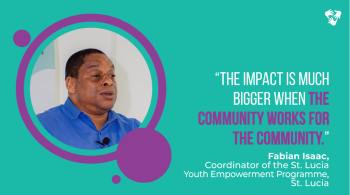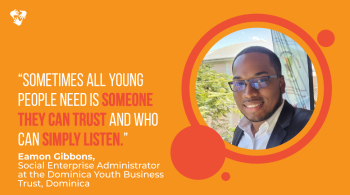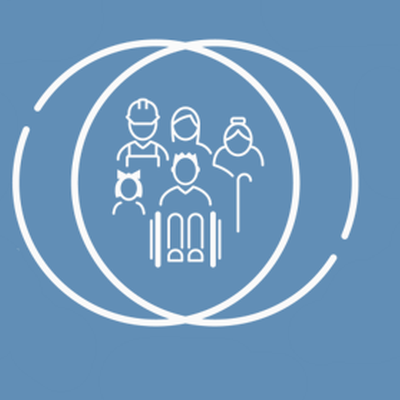The article is also available in French and Spanish.
Following a sharp decline in youth employment in Latin America and the Caribbean, largely due to the repercussions of the Covid-19 pandemic, recent data from the International Labour Organisation (ILO) has brought encouraging news. By the third quarter of 2022, the unemployment rate had dropped to pre-pandemic levels. Interestingly, “the recovery of employment in 2022 was stronger among women than men, and among young people than adults."1 However, much more needs to be done, particularly considering the multiple global crises impacting job creation across the board.
Within the framework of the Youth Action Plan in EU external action, providing youth with the skills and resources they need to prosper and develop their potential is a key priority for the EU and the EU-funded project titled “Civil Society Organisations (CSO) Programme: Enhancing CSO’s Contribution to governance and development processes in Barbados and the Eastern Caribbean.”
The latter was implemented by the Barbados Youth Business Trust in collaboration with the Dominica Youth Business Trust and the St. Lucia Youth Business Trust with the objective of contributing to inclusive, equitable and sustainable growth and socio-economic development for young people between 18 and 35 who have entrepreneurial ambitions. More specifically, the three youth trusts addressed the needs of aspiring entrepreneurs interested in starting their own ventures but with little or no prior business development knowledge.
Social Enterprises: from the community and for the community
The first lesson the young entrepreneurs who benefited from the project learnt was understanding the meaning of social enterprise, i.e. a business that reinvests its revenues and profits to address a social need or goal. Its objective is to maximise profits which will then be reinvested in a social cause or to address specific social issues. “Our primary objective was to assist younger generations by offering training and support in becoming entrepreneurs and make a positive impact on society. It was not just about providing skills and opportunities,” explained Cardelle Fergusson, General Manager of the Barbados Youth Business Trust, “but also to empower individuals to eventually establish their own businesses. We continuously brought in new talent and provided training with a focus on addressing the social needs of their own communities.”
The Social Enterprise Incubator, which helped young people in Barbados, Dominica and St. Lucia from the early stages all the way through to the launch of their new business ventures via business mentors,2 addressed a gap in social enterprise development. More importantly, it prioritised enterprise concepts with the primary purpose of employing young workers in the 16 to 30 age range, particularly from marginalised communities and/or facing barriers to employment.
“When you start a social enterprise, you mobilise your community to want to do more for itself, especially in terms of economic independence. Training more young people will lead to the creation of better economic and living conditions overall. It’s a win-win situation,” said Cardelle Fergusson.
|
Lessons learnt and tips from the implementers of the Social Enterprise Incubator |
1. Understand your environment and review the programme’s performance continuously.
One of the most important steps in designing and implementing a project like the Social Enterprise Incubator is understanding that there will be many moving parts on various levels. Even though the objectives and priorities seem to be quite straight forward, they rely on a very complex set of conditions.

National demand and legislation were two of the issues the programme’s implementers had to address at the onset of, and throughout, the programme’s implementation. “Understand your environment. Who are all the players? What legislative support can you have at this time? How do you tie in your project’s priorities to national demand? You need to create something that will address a need that you know will have support in the long run,” said Cardelle Fergusson.
If the government and local authorities understand that the programme to be implemented addresses a national need, the support will probably last because there is a vested interest, i.e. the economic development of the youth and of communities in general.
The lack of specialised legislation was another inherent challenge. In Barbados, most enterprises are registered as either for profit organisations or charities. Social enterprises, however, lie in between these two categorisations. A new legal typology needs to be created. Due to the fact that this project addressed nationally important issues and that the implementers worked closely with the Ministry of Commerce on the matter, there is a good chance that a change in legislation is feasible.
All of the above also meant that implementers had to continuously monitor and gauge needs and the performance of the planned actions, to adapt accordingly and in a timely manner. “Know your environment, know exactly what the need is and that there is high-level interest in addressing that need or change, so that you can create and implement a project that is necessary. Throughout the implementation, however, continue to revise performance and adapt to be as effective as possible,” concludes Cardelle Fergusson.
2. Engage with local communities and invest in the groundwork.
“With social enterprises, young entrepreneurs are helping young people like themselves,” said Fabian Isaac, Coordinator of the St. Lucia Youth Empowerment Programme, St. Lucia. “You are creating jobs for your community. You are helping generate income and this fosters better life conditions. It’s a domino effect: the impact is much bigger when the community works for the community.”

The initial lack of understanding of this fundamental idea, however, was one of the main challenges while implementing this project. At the beginning, community members were unclear on how the programme worked. Everyone thought there would be funding for young aspiring entrepreneurs. Taking the time to do the groundwork and explain in detail how the project really worked was critical. It was a matter of changing a very specific mindset: “It’s not only about business or profit. It’s about impact. You are not only earning money for your own company, but you are also creating change and economic opportunities for your community and your peers,” concluded Fabian Isaac.
The shift from perceiving business merely in commercial terms to understanding the importance of the positive impact on potentially struggling sections of society was challenging. However, by sharing success stories and engaging with the communities at the local level, it was possible to make a significant impact. Doing the groundwork is what made the difference.
3. Listen to concerns, address needs accordingly, and build trust.

Seeing young entrepreneurs make the transition from the idea stage all the way to launching a successful social enterprise was the best thing about this project, according to Eamon Gibbons, Social Enterprise Administrator at the Dominica Youth Business Trust. “The best thing was to see how they stood on their own feet after getting the business mentoring they needed.”
Young people’s low self-esteem and the lack of a trustworthy support system were among the challenges trainers and mentors were faced with initially. Many trainees came to the incubator with great ideas but lacked the confidence and the skills to transform their ideas and passions into viable businesses.
Listening to their concerns, their fears and their passions and goals gave them the solid foundation they needed to be receptive to the business concepts and methodologies taught during the training course.
"Be the best listener you can be. Be their motivator and keep on encouraging them. Listen to what they need because somewhere in there, there is potential ready to be honed. Sometimes all young people need is someone they can trust and who can simply listen,” concludes Eamon Gibbons.
Final thoughts: hopes for the future
“Young people can already make great contributions. What we need is capacity-building and training to enhance the skills that are already within them. The youth have concrete solutions, experiences, and ideas. We have to be involved in the different spaces that will affect us in the coming years,” insists Natalia Gómez Solano, the new Special Adviser on Youth to the EU. And economic development is one of those fundamental spaces that will allow the youth of today to create a more stable future for themselves and their communities.
One of the most important achievements of the Social Enterprise Incubator, was to provide guidance to a vulnerable (and, sometimes, marginalised) section of society that often lacks support. Many of them needed to discover their own potential and then be taught how to transform ideas and passions into something more tangible that could go on to benefit others in similar situations. This is precisely why programmes like this should be consistently replicated: including young people in social entrepreneurship and other sectors will be crucial for future economic growth.
Like, comment and share this article with your peers
|
Further strengthening the development of youth skills “I believe that an important job is being done, especially with reference to the promotion of spaces for the development of young entrepreneurs in various areas, including agriculture and ecosystem protection. This is particularly significant in a system where they are not always favoured. I consider it crucial for these efforts to continue, as they enable the strengthening of local capacities, skills development, and the financing of valuable initiatives led by young people who are already active. All of this contributes to the creation of more green jobs. With reference to the project in Barbados, Dominica and St. Lucia, I think it is important that efforts are replicated: the youth in this region can share their experiences, recommendations, and learnings with other young people to build between peers. Additionally, I believe that it is vital to scale up and replicate these initiatives in other countries of the region (and beyond), based on the learning and the unique characteristics of each territory.” |
1. Informality and working poverty weigh down labour markets in Latin America and the Caribbean, ILO.
2. Trainees were assigned business mentors who helped them throughout the whole process, from business ideation to launching a successful business venture. The mentors were either experts in the field the trainee was interested in opening a business in, or they were area specialists in sectors where the trainee’s venture was lacking. For example, if a new potential business was lacking accounting knowledge, the programme would provide the future business owner with a business mentor to help set up the new company’s accounting system.




Log in with your EU Login account to post or comment on the platform.